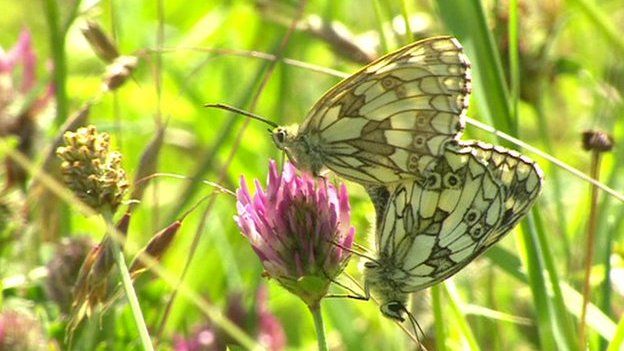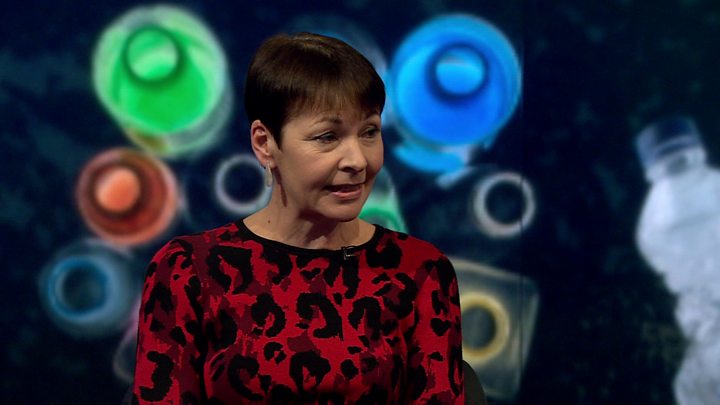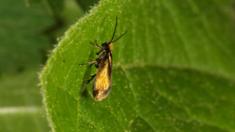Theresa May has pledged to eradicate all avoidable plastic waste in the UK by 2042.
The commitment is part of the government's 25-year plan to improve the natural environment.
In her speech to launch the plan the prime minister said: "I think people will be shocked at how today we allow so much plastic to be produced needlessly."
But green groups are angry the proposals will have no legal force.
They say the plans could simply be shelved if they become inconvenient and the promise to stop "avoidable" plastic waste is too vague.
- Reality Check: Where does the plastic bag charge go?
- Seven charts that explain plastic pollution
- Six simple ways to cut back on plastic
- Plastic microbead ban: What impact will it have?
Labour suggested the proposals were a "cynical attempt at rebranding the Tories' image" while the Liberal Democrats said it "beggared belief" that a target of 2042 had been set for removing plastic waste and that action was needed now.
Under the plan, supermarkets will be urged to introduce "plastic-free" aisles while taxes and charges on single-use items such as takeaway containers will be considered.
Mrs May's announcements, which have been agreed by cabinet, also include:
- Confirmation of the extension of the 5p charge for plastic carrier bags to all retailers in England
- Government funding for plastics innovation
- A commitment to help developing nations tackle pollution and reduce plastic waste, including through UK aid
In her speech, Mrs May said: "We look back in horror at some of the damage done to our environment in the past and wonder how anyone could have thought that, for example, dumping toxic chemicals into rivers was ever the right thing to do."
She called plastic waste "one of the great environmental scourges of our time", adding: "In the UK alone, the amount of single-use plastic wasted every year would fill 1,000 Royal Albert Halls."
Meanwhile, plans to help more children engage with the environment will include £10m for school visits and a programme to create school grounds that allow youngsters to learn more about the natural world.
Mrs May said she would put the oceans firmly on the agenda of the Commonwealth Heads of Government Meeting in April.
Analysis by the BBC's Roger Harrabin

Thursday's announcements are the culmination of an environmental week for the government. On Sunday, Mrs May promised a clampdown on plastic waste. On Wednesday, plans emerged to extend the 5p plastic bag charge to include corner shops in England.
Ministers have been under political pressure to do more for the environment after it was identified by the Tory think-tank Bright Blue as the key issue for young voters, who failed to back the party in large numbers at the 2017 general election.
Environmentalists agree that the government's plan to restore nature - not just safeguard nature - is genuinely radical.
Many of the UK's landscapes have been ravaged by development, intensive farming and sheep grazing. Only 2% of wildflower meadows have survived.
I understand that the document will cover many policy areas, including: managing land sustainably; enhancing nature and recovering wildlife; increasing people's health and well-being through nature; resource efficiency, reduction of pollution and waste and protecting and improving the global environment.
But there is scepticism about how far the environment department Defra will be able to carry out its plans.
There are huge pressures on the natural world from urgently needed house-building; HS2 threatens scores of ancient woodlands; and the Department for Transport has a major road-building programme.
Environment Secretary Michael Gove told us at the BBC he wanted the government to "set the global gold standard" on the environment.
He also said ministers were "reflecting" on a proposal from a Commons committee for a 25p charge on disposable cups.

Greenpeace said Mrs May's announcement was a "missed opportunity" and while the focus on plastic waste solutions was welcome, the plan "lacked urgency, detail and bite".
The campaign group questioned why there was no mention of deposit return schemes which it said were a "tried-and-tested" way of keeping bottles out of the natural environment and were popular with the public.
Craig Bennett, head of Friends of the Earth, said it welcomed any moves to restore the natural world, including landscapes and wildlife.
"But we need a clear timetable of short-term delivery of schemes, not just woolly promises of doing something good in the future," he added.
"It's nice seeing ministers hug trees - but why are they continuing with unpopular fracking when we've already found more fossil fuels than we can be allowed to burn if we want a stable climate?"
Tom Burke, from the green think-tank e3g, welcomed many elements of the plan, but said: "There are lots of things this plan doesn't deal with. [The government's] being taken to court for the third time over illegal levels of air pollution."
Stephanie Hilborne from the Wildlife Trusts said: "This plan looks good in many ways, but it has no legal under-pinning so it could completely disappear."
Sue Hayman, Labour's environment spokeswoman, said the Conservatives had a record of "failure and broken promises" on the environment.
She said the "weak" proposals would mean the problem with plastic waste was "kicked into the long grass".
Science & Environment
Expanding cosmos hints at new physics
- 11 January 2018
- Science & Environment
Butterfly origins pushed back in time
- 11 January 2018
- Science & Environment
- 8
Light shed on mystery space radio pulses
- 10 January 2018
- Science & Environment




No comments:
Post a Comment